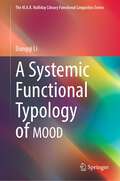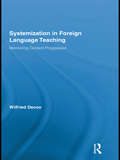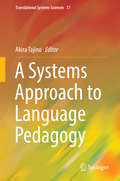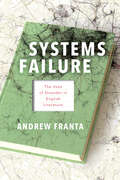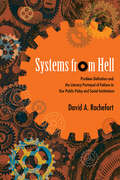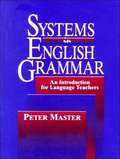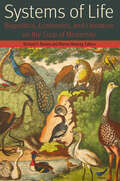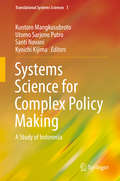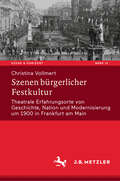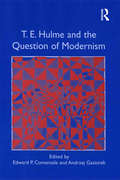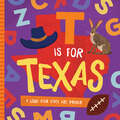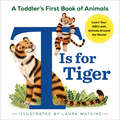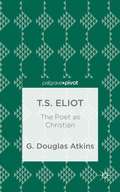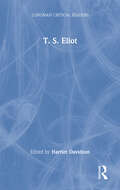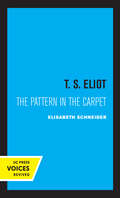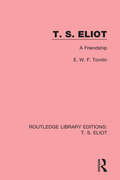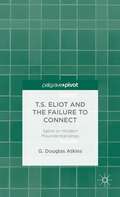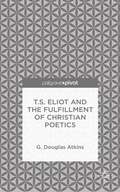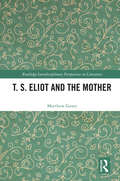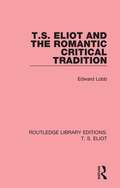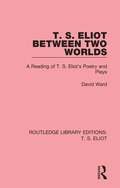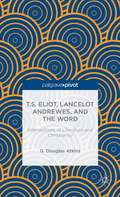- Table View
- List View
A Systemic Functional Typology of MOOD (The M.A.K. Halliday Library Functional Linguistics Series)
by Dongqi LiThe grammatical category of (sentence) mood has been of central interest to many branches of linguistics, including linguistic typology and systemic functional linguistics. This book is a successful integration of the typological and systemic functional approaches to mood, aiming to investigate the commonalities and variations across languages in both mood system and mood structure. To this aim, it establishes a geographically, genetically and typologically representative sample of 60 languages and provides detailed systemic functional descriptions of the mood system and mood structure of these languages. Based on such descriptions, it makes cross-linguistic comparisons of the mood system and mood structure of the languages in the sample. Structurally, it explores the cross-linguistic commonalities and variations in (i) the realizations of some major functional elements in mood structure, (ii) the realizations of mood options and (iii) the realizations of mood system. Systemically, it investigates how languages resemble and vary from each other in (i) the subtypes of major mood types, (ii) the organization of mood system and (iii) the semantic dimensions along which mood system is elaborated further in delicacy. Moreover, building on the descriptions and comparisons, it makes some generalizations about the structural and systemic features of mood and proposes some tentative explanations for the commonalities and variations languages display in mood system and mood structure. This book is an empirical and holistic approach to the typology of mood and contributes to a deeper understanding of the grammatical category. It is of special interest to systemic functional linguists, typologists, grammarians and descriptive linguists.
Systemization in Foreign Language Teaching: Monitoring Content Progression (Routledge Research in Education)
by Wilfried DecooForeign language learning is a progressive endeavor. Whatever the method, the learner should advance from one point to another, constantly improving. Growing proficiency entails growing language content. Content is complex, displaying many dimensions. Syllabus designers, textbook authors, and teachers often struggle with the monitoring of content. Computer-assisted systemization helps to handle it in a manageable framework. Besides inventorying content, it ensures more balanced selections, calculated progression, and controlled reiteration of previously learned material. It gauges the usability of authentic material in relation to the level attained. During the teaching process, it allows the instant selection of items needed for a communicative situation, focus on forms, or particular exercises. This book first describes the theoretical background for systemization, including a historical overview, with special attention to the Common European Framework and the new Profiles and Referentials. Next the practical steps for computer-assisted implementation with examples taken from French and English, but applicable to any language.
A Systems Approach to Language Pedagogy (Translational Systems Sciences #17)
by Akira TajinoThis volume represents the first attempt in the field of language pedagogy to apply a systems approach to issues in English language education. In the literature of language education, or more specifically, second or foreign language learning and teaching, each topic or issue has often been dealt with independently, and been treated as an isolated item. Taking grammar instruction as an example, grammatical items are often taught in a sequential, step-by-step manner; there has been no “road map” in which the interrelations between the various items are demonstrated. This may be one factor that makes it more difficult for students to learn the language organically. The topics covered in this volume, including language acquisition, pedagogical grammar, and teacher collaboration, are viewed from a holistic perspective. In other words, language pedagogy is approached as a dynamic system of interrelations. In this way, “emergent properties” are expected to manifest. This book is recommended for anyone involved in language pedagogy, including researchers, teachers, and teacher trainers, as well as learners.
Systems Failure: The Uses of Disorder in English Literature
by Andrew FrantaHow eighteenth-century writers stretched systems designed to explain social relations to their breaking point, showing the flaws in their design.The Enlightenment has long been understood—and often understood itself—as an age of systems. In 1759, Jean Le Rond d'Alembert, one of the architects of the Encyclopédie, claimed that "the true system of the world has been recognized, developed, and perfected." In Systems Failure, Andrew Franta challenges this view by exploring the fascination with failure and obsession with unpredictable social forces in a range of English authors from Samuel Johnson to Jane Austen.Franta argues that attempts to extend the Enlightenment's systematic spirit to the social world prompted many prominent authors to reject the idea that knowledge is synonymous with system. In readings of texts ranging from novels by Sterne, Smollett, Godwin, and Austen to Johnson's literary biographies and De Quincey's periodical essays, Franta shows how writers repeatedly take up civil and cultural institutions designed to rationalize society only to reveal the weaknesses that inevitably undermine their organizational and explanatory power. Diverging from influential accounts of the rise of the novel, Systems Failure audaciously reveals that, in addition to representing individual experience and social reality, the novel was also a vehicle for thinking about how the social world resists attempts to explain or comprehend it. Franta contends that to appreciate the power of systems in the literature of the long eighteenth century, we must pay attention to how often they fail—and how many of them are created for the express purpose of failing. In this unraveling, literature arrives at its most penetrating insights about the structure of social life.
Systems from Hell: Problem Definition and the Literary Portrayal of Failure in Our Public Policy and Social Institutions (SUNY series in New Political Science)
by David A. RochefortThis book approaches contemporary fiction as a medium for policy advocacy, one whose narrative devices both link it to, and distinguish it from, other forms of public discourse. Using the framework of political agenda setting, David A. Rochefort analyzes the rhetorical function of problem definition played by literary works when they document and characterize social issues while sounding the call for systemic reform. Focusing on a group of noteworthy realist novels by American authors over the past twenty years, this study maintains that fictional narrative is a potentially influential instrument of "empathic policy argument." The book closes by examining the agenda-setting dynamics through which a social problem novel can contribute to the process of policy change.
Systems In English Grammar: An Introduction For Language Teachers
by Peter MasterThis book teaches teachers how to present grammar lessons to their students with confidence and clarity. Introduces future teachers of English to the major elements of English grammar in a systematic fashion, using step-by-step procedures, charts, diagrams, and exercises. Includes a complete answer key to exercises.
Systems of Life: Biopolitics, Economics, and Literature on the Cusp of Modernity (Forms of Living)
by Richard A. Barney and Warren MontagSystems of Life offers a wide-ranging revaluation of the emergence of biopolitics in Europe from the mid– eighteenth to the mid–nineteenth century. In staging an encounter among literature, political economy, and the still emergent sciences of life in that historical moment, the essays collected here reopen the question of how concepts of animal, vegetable, and human life, among other biological registers, had an impact on the Enlightenment project of thinking politics and economics as a joint enterprise. The volume’s contributors consider politics, economics, and the biological as distinct, semi-autonomous spheres whose various combinations required inventive, sometimes incomplete, acts of conceptual mediation, philosophical negotiation, disciplinary intervention, or aesthetic representation.
Systems Science for Complex Policy Making: A Study of Indonesia (Translational Systems Sciences #3)
by Kuntoro Mangkusubroto Utomo Sarjono Putro Santi Novani Kyoichi KijimaThis volume applies a systems science perspective to complex policy making dynamics, using the case of Indonesia to illustrate the concepts. Indonesia is an archipelago with a high heterogeneity. Her people consist of 1,340 tribes who are scattered over 17,508 islands. Every region has different natural strengths and conditions. In the national development process all regions depend on one another other while optimizing their own conditions. In addition to this diversity, Indonesia also employs a democratic system of government with high regional autonomy. A democratic government puts a high value on individual freedom, but on the other hand, conflicts of interest also occur frequently. High regional autonomy also often causes problems in coordination among agencies and regional governments. This uniqueness creates a kind of complexity that is rarely found in other countries.These daily complexities requires intensive interaction, negotiation processes, and coordination. Such necessities should be considered in public policy making and in managing the implementation of national development programs. In this context, common theories and best practices generated on the basis of more simplified assumptions often fail. Systems science offer a way of thinking that can take into account and potentially overcome these complexities. However, efforts to apply systems science massively and continuously in real policy making by involving many stakeholders are still rarely carried out. The first part of the book discusses the gap between the existing public policy-making approach and needs in the real world. After that, the characteristics of the appropriate policy-making process in a complex environment and how this process can be carried are described. In later sections, important systems science concepts that can be applied in managing these complexities are discussed. Finally, the efforts to apply these concepts in real cases in Indonesia are described.
Szenen bürgerlicher Festkultur: Theatrale Erfahrungsorte von Geschichte, Nation und Modernisierung um 1900 in Frankfurt am Main (Szene & Horizont. Theaterwissenschaftliche Studien #12)
by Christina VollmertAm Beispiel der Stadt Frankfurt a.M. untersucht die interdisziplinäre Studie anhand dreier Fallstudien das komplexe Verhältnis zwischen gesellschaftlichen, politischen und medienkulturellen Transformationsprozessen und bürgerlicher Festkultur als Ort sozialer Bedeutungskonstruktion. Von historischen Stadt- und Künstlerfesten über politisch aufgeladene Schützenfeste bis hin zu spektakulären Industrie- und Gewerbeausstellungen werden die untersuchten Feste als theatrale Aufführungen verstanden, die die Veränderungen der Modernisierung um 1900 reflektieren und tiefe Einblicke in die soziokulturellen Umbrüche jener Zeit ermöglichen. Das Theatrale als bewusste und demonstrative Betonung des Zur-Schau-Stellens wird in dieser Studie als kulturelle Praxis gedeutet, die als Vermittler in einer Zeit der Umbrüche agieren kann: Indem die analysierten Feste abstrakte und ideologisch aufgeladene Konzepte wie Geschichte, Nation oder Modernisierung im Moment ihrer sinnlichen Zurschaustellung unmittelbar erfahrbar machen, ermöglichen sie eine Teilhabe an einem ästhetischen Erlebnis, das zum Verständnis und zur Akzeptanz der vermittelten Inhalte führen kann. Die Studie eröffnet damit eine neue Perspektiven auf die bislang gängigen Narrative der Kultur- und Modernisierungsgeschichte des 19. Jahrhunderts.
T.E. Hulme and the Question of Modernism
by Andrzej GasiorekThough only 34 years old at the time of his death in 1917, T.E. Hulme had already taken his place at the center of pre-war London's advanced intellectual circles. His work as poet, critic, philosopher, aesthetician, and political theorist helped define several major aesthetic and political movements, including imagism and Vorticism. Despite his influence, however, the man T.S. Eliot described as 'classical, reactionary, and revolutionary' has until very recently been neglected by scholars, and T.E. Hulme and the Question of Modernism is the first essay collection to offer an in-depth exploration of Hulme's thought. While each essay highlights a different aspect of Hulme's work on the overlapping discourses of aesthetics, politics, and philosophy, taken together they demonstrate a shared belief in Hulme's decisive importance to the emergence of modernism and to the many categories that still govern our thinking about it. In addition to the editors, contributors include Todd Avery, Rebecca Beasley, C.D. Blanton, Helen Carr, Paul Edwards, Lee Garver, Jesse Matz, Alan Munton, and Andrew Thacker.
T is for Texas: A Lone Star State ABC Primer
by Trish MadsonTake an alphabetized field trip around the Lone Star State and discover the plants, animals, foods, and places that make it, well, Texas!
T Is for Tiger: A Toddler's First Book of Animals
by Laura WatkinsFrom alligator to zebra—wild animals make learning the alphabet come alive for kids ages 2 to 4 What could be more fun than learning about the alphabet and all sorts of amazing animals at the same time? T Is for Tiger goes beyond other animal books for toddlers and introduces your little one to letters in an simple and fascinating format with colorful illustrations and plenty of critters they'll never forget. Everything animal books for toddlers should be: A worldwide adventure—Discover animals for every letter of the alphabet—even Q and X—as they appear in their natural environments. Engaging and educational—Unlike other animal books for toddlers, T Is for Tiger features realistic illustrations that help your toddler recognize animals and their homes. Go beyond the ABCs—You won't need other animal books for toddlers—revisit the pages and continue the learning as your child grows with animal fun facts, a world map, and more. Teach your little one about letters and animals all at once—from A is for alligator to Z is for zebra. When it comes to animal books for toddlers, this one roars with fun.
T is for Turkey: A True Thanksgiving Story
by Tanya Lee StoneLittle ones will love learning about Thanksgiving in Tanya Lee Stone's newest shaped alphabet book. Join in as the elementary school puts on a play that tells the true story of the first Thanksgiving. Rhyming couplets that flow through the alphabet help kids celebrate everything from Harvest to Pilgrims to Turkey.
T.S. Eliot: The Poet as Christian
by G. Douglas AtkinsBy comparing and contrasting the pre-conversion and the post-conversion poetics and poetic practices of T. S. Eliot, this book elucidates the responsibilities and opportunities for a poet who is also Christian. This book is the second in a trilogy which includes T. S. Eliot, Lancelot Andrewes, and the Word.
T. S. Eliot (Longman Critical Readers)
by Harriet DavidsonOne of the most influential poets of the twentieth century, T. S. Eliot is generally regarded as a leading exponent of the literary movement which came to be known as Modernism. In this volume, Harriet Davidson collects key recent essays by such internationally renowned critics as Terry Eagleton, Sandra Gilbert, Jacqueline Rose, Jeffrey Perl, Christine Froula, Maud Ellmann, and Michael North, placing Eliot's work centrally in the context of postmodern critical theory.Eliot's writing is often perceived as incompatible with or resistant to new theoretical approaches, but this volume demonstrates the continuity between Eliot's own theoretical writings and contemporary theory, and illuminates his poetry with imaginative readings from deconstructive, Marxist, psychoanalytic, and feminist perspectives. Headnotes to the essays and a bibliography which lists other informative readings make this book an invaluable guide to all students of twentieth-century poetry, and to scholars interested in the relationship between critical and creative writing.
T. S. Eliot: The Pattern in the Carpet
by Elisabeth W. SchneiderThis title is part of UC Press's Voices Revived program, which commemorates University of California Press’s mission to seek out and cultivate the brightest minds and give them voice, reach, and impact. Drawing on a backlist dating to 1893, Voices Revived makes high-quality, peer-reviewed scholarship accessible once again using print-on-demand technology. This title was originally published in 1975.
T. S. Eliot: A Friendship (Routledge Library Editions: T. S. Eliot)
by Frederick TomlinFirst published in 1988. Fredrick Tomlin and T. S. Eliot were friends for almost thirty-four years. What emerges from Fredrick Tomlin’s memories and the many letters which passed between them is a private Eliot, seen only by his closest family and a trusted few. Tomlin evokes the man as he was – quite different in his humanity and in his humour from the public image of the ‘great poet’ and the austere sage. With fresh insights and personal testimony, Tomlin directs light onto aspects of Eliot’s character and personality of which the public has been unaware, thereby enhancing the reader’s appreciation of Eliot’s work as a whole. This title will be of interest to students of literature.
T.S. Eliot and the Failure to Connect: Satire and Modern Misunderstandings
by G. Douglas AtkinsHere, G. Douglas Atkins offers a fresh new reading of the past century's most famous poem in English, T. S. Eliot's The Waste Land (1922). Using a comparatist approach that is both intra-textual and inter-textual, this book is a bold analysis of satire of modern forms of misunderstanding.
T.S. Eliot and the Fulfillment of Christian Poetics
by G. Douglas AtkinsApplying new readings of Four Quartets, this book completes a trilogy on the Christian character of Eliot's writing.
T. S. Eliot and the Mother (Routledge Interdisciplinary Perspectives on Literature)
by Matthew GearyThe first full-length study on T. S. Eliot and the mother, this book responds to a shortfall in understanding the true importance of Eliot’s poet-mother, Charlotte Champe Stearns, to his life and works. In doing so, it radically rethinks Eliot’s ambivalence towards women. In a context of mother–son ambivalence (simultaneous feelings of love and hate), it shows how his search for belief and love converged with a developing maternal poetics. Importantly, the chapters combine standard literary critical methods and extensive archival research with innovative feminist, maternal and psychoanalytic theorisations of mother–child relationships, such as those developed by Julia Kristeva, Luce Irigaray, Jessica Benjamin, Jan Campbell and Rozsika Parker. These maternal thinkers emphasise the vital importance and benefit of recognising the pre-Oedipal mother and maternal subjectivity, contrary to traditional, repressive Oedipal models of masculinity. Through this interdisciplinary approach, the chapters look at Eliot’s changing representations and articulations of the mother/ mother–child relationship from his very earliest writings through to the later plays. Focus is given to decisive mid-career works: Ash-Wednesday (1930), ‘Marina’ (1930), ‘Coriolan’ (1931–32) and The Family Reunion (1939), as well as to canonical works The Waste Land (1922) and Four Quartets (1943). Notably, the study draws heavily on the wide range of Eliot materials now available, including the new editions of the complete poems, the complete prose and the volumes of letters, which are transforming our perception of the poet and challenging critical attitudes. The book also gives unprecedented attention to Charlotte Eliot’s life and writings and brings her individual female experience and subjectivity to the fore. Significantly, it establishes Charlotte’s death in 1929 as a decisive juncture, marking both Eliot’s New Life and the apotheosis of the feminine symbolised in Ash-Wednesday. Central to this proposition is Geary’s new formulation for recognising and examining a maternal poetics, which also compels a new concept of maternal allegory as a modern mode of literary epiphany. T. S. Eliot and the Mother reveals the role of the mother and the dynamics of mother–son ambivalence to be far more complicated, enduring, changeable and essential to Eliot’s personal, religious and poetic development than previously acknowledged.
T. S. Eliot and the Romantic Critical Tradition (Routledge Library Editions: T. S. Eliot #5)
by Edward LobbEdward Lobb’s study, first published in 1981, is a thorough examination of Eliot’s relation to Romantic criticism. This title also makes extensive use of Eliot’s Clark Lectures on metaphysical poetry. Delivered in 1926, the lectures complete the picture of literary history set out in Eliot’s published work, and are, the author believes, essential to a full understanding of the poet’s ideas and their place in tradition. Drawing on a wide variety of primary sources and earlier scholarship, T. S. Eliot and the Romantic Critical Tradition will be of interest to students of literature.
T. S. Eliot Between Two Worlds: A Reading of T. S. Eliot's Poetry and Plays (Routledge Library Editions: T. S. Eliot #10)
by David WardThe basis of this critical examination of Eliot’s work, first published in 1973, is the investigation of his transmutation of this and other philosophical, mythological and religious motives into the textures of his verse. This book focuses on Eliot’s peculiar eclectic approach to what he described as ‘the Tradition’. It also recognises the fact that Eliot, for all his attempts at universality, was a product of time and place, and gives an account of the way in which his education and experience shaped his most important interests. This title will be of interest to students of literature.
T. S. Eliot in Context
by Jason HardingT. S. Eliot's work demands much from his readers. The more the reader knows about his allusions and range of cultural reference, the more rewarding are his poems, essays and plays. This book is carefully designed to provide an authoritative and coherent examination of those contexts essential to the fullest understanding of his challenging and controversial body of work. It explores a broad range of subjects relating to Eliot's life and career; key literary, intellectual, social and historical contexts; as well as the critical reception of his oeuvre. Taken together, these chapters sharpen critical appreciation of Eliot's writings and present a comprehensive, composite portrait of one of the twentieth century's pre-eminent men of letters. Drawing on original research, T. S. Eliot in Context is a timely contribution to an exciting reassessment of Eliot's life and works, and will provide a valuable resource for scholars, teachers, students and general readers.
T.s. Eliot, Lancelot Andrewes, And The Word: Intersections Of Literature And Christianity
by G. Douglas AtkinsWith special attention to the poems For Lancelot Andrewes, Journey of the Magi, and Ash-Wednesday , G. Douglas Atkins offers an exciting new analysis of T. S. Eliot's debt to the seventeenth-century churchman Lancelot Andrewes and his theories of reading and writing texts.
